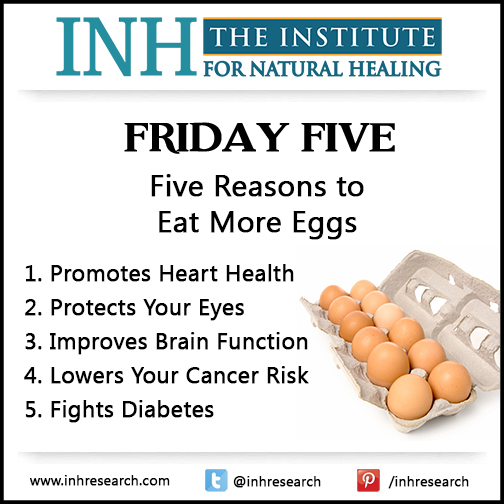Your doctor might think eating eggs will increase your cholesterol levels… That they may even lead to heart disease. But this superfood is full of vitamins and minerals your body needs. And the most nutritious part of the egg is the part they tell you NOT to eat.
Bottom line: when it comes to eggs, the mainstream is just plain wrong. Here are five reasons to eat more.
1. Promotes Heart Health: An egg a day doesn’t increase your heart disease risk.1 In fact, after four decades of bad science, the mainstream even now agrees that eggs are safe to eat—even heart-healthy.2 Eggs are protein powerhouses. Their content is split almost equally between the white and yolk. And it may be the highest quality protein you can eat.3 Health Watch readers know eating more protein helps lower blood pressure by up to 40%.
This breakfast staple contains other heart-healthy nutrients…like vitamins B12, D3, and folate.4 They’re all in the yolk. Vitamin B12 and folate work together to break down homocysteine. High levels of it can increase your risk of coronary heart disease.5
2. Protects Your Eyes: Vitamin B12 plays a part here too. We’ve told you before that a deficiency can make you 2.5 times more likely to develop age-related macular degeneration. Supplementing with it each day can reduce your risk by 47%. And every egg you eat helps deliver more of this nutrient to your eyes.
Eggs are also rich in lutein and zeaxanthin. These carotenoids protect your eyes from light damage. Just 6 mg of lutein a day can decrease macular degeneration risk by 43%.6 Eating one egg every day can increase the levels of these antioxidants in your body by at least 25%.7
3. Improves Brain Function: Choline plays a key role in getting signals to and from the brain. Yet 90% of adults aren’t getting enough.8 This can increase your risk of Alzheimer’s.9 But large eggs can give you 250 mg of this brain-boosting nutrient.10 That’s over half the recommended daily intake.11
And like we mentioned above, eating them will also give you a dose of vitamin D3. A severe deficiency in this vitamin can increase your risk of mental decline by 394%. But being even moderately deficient can raise your risk of mental problems by 42%.
4. Lowers Your Cancer Risk: Speaking of vitamin D3…getting more of it may help reduce your risk of prostate cancer. It can also lower your odds of developing breast cancer by over 50%. One study found low levels of D3 may be linked to higher risk of cancer death.12
Omega-3s prevent the growth of cancer cells.13 Research shows they may even kill cancerous cells.14 And eggs are a great place to get them. A single egg contains about 450 mg omega-3 fatty acids.15 But you should aim for about twice that amount every day.16
5. Fights Diabetes: A study found men who ate about four eggs a week were 37% less likely to develop type 2 diabetes than those who only consumed one.17
Eating eggs helps lower blood sugar levels. That’s because they contain selenium. We’ve told you before it prevents inflammation…and lowers your risk of insulin resistance. A selenium-rich diet may help make you 24% less likely to develop this disease.
There’s nothing dangerous about starting your morning with a serving of eggs. But they don’t just have to be served for breakfast. You can add them to just about any meal. A poached or hardboiled egg can also make a great snack. Just make sure they’re fresh, organic, and coming from pastured—free-roaming—chickens.
In Good Health,

Angela Salerno
Publisher, INH Health Watch
Like this Article? Forward this article here or Share on Facebook.

References:
1http://www.ncbi.nlm.nih.gov/pubmed/10217054?dopt=Citation
2http://www.bu.edu/today/2015/lynn-moore-cholesterol/
3http://www.livestrong.com/article/440659-is-egg-a-brain-food/
4http://www.hsph.harvard.edu/nutritionsource/eggs/
5http://www.heart.org/HEARTORG/GettingHealthy/NutritionCenter/Homocysteine-Folic-Acid-and-Cardiovascular-Disease_UCM_305997_Article.jsp
6https://www.macular.org/nutrition-macular-degeneration
7http://www.saudereggs.com/umlstudy.htm
8http://www.livestrong.com/article/440659-is-egg-a-brain-food/
9http://lpi.oregonstate.edu/infocenter/othernuts/choline/
10http://nurse-practitioners-and-physician-assistants.advanceweb.com/Sharedresources/advanceforNP/Resources/DownloadableResources/NP050108_p29PatHandout_PH.pdf
11http://www.berkeleywellness.com/supplements/vitamins/article/should-you-boost-your-choline
12http://www.medicalnewstoday.com/articles/278323.php
13http://www.institutefornaturalhealing.com/2012/07/five-simple-ways-to-virtually-eliminate-your-risk-of-cancer/
14http://www.sciencedaily.com/releases/2013/08/130801095513.htm
15http://www.theglobeandmail.com/life/health-and-fitness/ask-a-health-expert/omega-3-eggs-healthier-choice-or-marketing-gimmick/article4574714/
16http://meg-3.com/about-omega-3/recommended-intake/
17https://au.lifestyle.yahoo.com/health/news/a/26968916/study-finds-eggs-may-cut-diabetes-risk/

